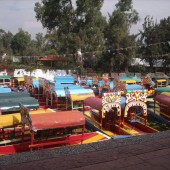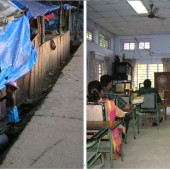Abstract: Decolonization is a multifaceted and complex process, involving a wide range of concepts, including the restoration of Indigenous lands to Indigenous control, improved recognition of tribal sovereignty, strengthening of Indigenous worldviews and knowledge traditions, cultivating cultural responsiveness in education and health care, aligning research methods with Indigenous cultural priorities and values, and more.
This special issue of the Journal of Sustainability Education on the topic of Decolonization and Sustainability Education reflects many of these diverse projects. The issue is inclusive of Indigenous and allied voices, of academic and Indigenous discourses, of large-scale political actions and—what Jeff Corntassel calls—“everyday acts of resurgence.” The selections are arranged in ways that center Indigenous voices and the work on the ground that reinforces Indigenous sustainabilities and Indigenous-centered pedagogies.
Continue ReadingAbstract: Since the 1990s research has been telling us that indigenous students do better in school when they are connected to their cultures. Our experience affirms studies concluding that students who have strong connections to their culture are more resilient and have a stronger sense of efficacy.
Continue Reading
The educational experience described in this article was developed in the course “Social and Cultural Contexts of Teaching” for the Sociology of Education bachelor’s degree at the National Pedagogical University, Mexico. In this course, students are expected to develop favorable attitudes toward the environment. The student’s defined environmental problems made a diagnosis and elaborated a case study, to discuss concrete solutions in their community. The educational experience included several moments: framing, joint planning of individual and group activities, and development of the case study. The balance of the results of the course was favorable; the group learned to work cooperatively, mutual trust prevailed within the teams, group agreements were respected, the group goal was clearly defined, and a case study was delineated and developed.
Continue Reading
La experiencia educativa que se describe en este artículo se desarrolló en el curso “Contextos sociales y culturales de la enseñanza” de la licenciatura de Sociología de la Educación en la Universidad Pedagógica Nacional, México. En este curso, se espera que los estudiantes desarrollen actitudes favorable hacia el medio ambiente; los estudiantes delimitaron problemas ambientales, hicieron un diagnóstico y elaboraron un estudio de caso, para discutir soluciones concretas. Desde el reconocimiento de la crisis ambiental y un problema ambiental específico, los estudiantes desarrollan un estudio de caso de un problema ambiental de su comunidad. La experiencia educativa comprende varios momentos: encuadre, planificación conjunta de actividades individuales, grupales y desarrollo del estudio de caso. El balance de los resultados del curso fue favorable; el grupo aprendió a trabajar de forma cooperativa, prevaleció la confianza mutua dentro de los equipos, se respetaron los acuerdos grupales, se definió claramente el objetivo del grupo y se delineó y desarrolló un estudio de caso.
Continue Reading
Among all the pressing needs for educational innovations that we face today, arguably the most imperative is the need to elicit learners’ active collaboration towards a ‘Great Transition’ into a secure and sustainable future for humanity. Among the numerous challenges that this endeavour entails, the anticipated arrival of unprecedented numbers of climate refugees will severely challenge the capacities of host institutions to maintain human security – connecting to a second pressing need, namely to promote and maintain cultural safety for newcomers and hosts. We focus on the question how compatible those two educational projects might be. To what extent could a Transition curriculum include and inform a curriculum for cultural safety, and how could a curriculum devoted to the principles of decolonisation internalise the need for living within our means? Neither one can be successful without the other. In general the two educational projects are reconcilable and inform and reinforce each other. However, some specific objectives of the Transition curriculum, mainly in the affective domain, require careful attention to cultural differences and reasoned compromise.
Continue Reading
Abstract: This paper introduces an experiential learning assignment “Snow Challenge 2015” incorporated into an undergraduate-level interdisciplinary humanities and social science-based course focusing on a single Arctic Indigenous culture: the Sámi [Lapps] of Finland, Norway, Sweden, and the Kola Peninsula. The assignment used the open-source app Siftr and an accompanying open-access informational website on Sámi snow terms to allow students to apply Lule Sámi snow terminology to snow phenomena they observed in and around their home campuses and neighborhoods. The assignment’s goal was to enhance student learning related to each of the four categories of environmental literacy presented in Hollweg et al.’s (2011) framework: knowledge, attitudes, competencies, and behaviors. A content analysis of a random sampling of student essays written at the conclusion of the assignment showed significant enhancement of student learning, particularly in the areas of attitudes and competencies. The assignment helped model for students the value and nature of an Indigenous-centered curriculum and the pragmatic nature of Indigenous traditional knowledge in living effectively within a winter environment.
Continue Reading